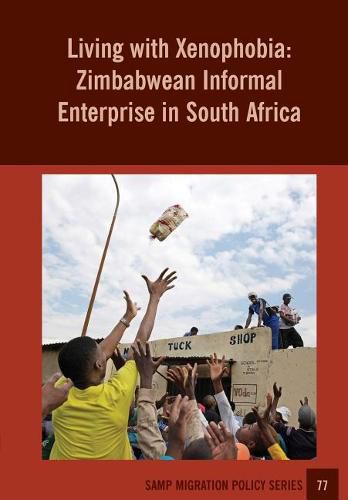Readings Newsletter
Become a Readings Member to make your shopping experience even easier.
Sign in or sign up for free!
You’re not far away from qualifying for FREE standard shipping within Australia
You’ve qualified for FREE standard shipping within Australia
The cart is loading…






This title is printed to order. This book may have been self-published. If so, we cannot guarantee the quality of the content. In the main most books will have gone through the editing process however some may not. We therefore suggest that you be aware of this before ordering this book. If in doubt check either the author or publisher’s details as we are unable to accept any returns unless they are faulty. Please contact us if you have any questions.
This report examines the impact of xenophobic violence on Zimbabweans who are trying to make a living in the South African informal sector and finds that xenophobic violence has several key characteristics that put them at constant risk of losing their livelihoods and their lives. The businesses run by migrants and refugees in the informal sector are a major target of South Africa’s extreme xenophobia. Attitudinal surveys clearly show that South Africans differentiate migrants by national origin and that Zimbabweans are amongst the most disliked. This report is based on a survey of informal sector enterprises in Cape Town and Johannesburg; and 50 in-depth interviews with Zimbabwean informal business owners in Cape Town, Johannesburg and Polokwane who had been affected by xenophobic violence. In many areas, community leaders are ineffective in dealing with the violence and, in some cases, they actively foment hostility and instigate attacks. The fact that migrant entrepreneurs provide goods, including food, at competitive prices and offer credit to consumers is clearly insufficient to protect them when violence erupts. However, the deep-rooted crisis in Zimbabwe makes return home a non- viable option and Zimbabweans instead adopt several self-protection strategies, none of which is ultimately an insurance against xenophobic attack. The findings in this report demonstrate that xenophobic violence fails in its two main aims: to drive migrant entrepreneurs out of business and to drive them out of the country.
$9.00 standard shipping within Australia
FREE standard shipping within Australia for orders over $100.00
Express & International shipping calculated at checkout
This title is printed to order. This book may have been self-published. If so, we cannot guarantee the quality of the content. In the main most books will have gone through the editing process however some may not. We therefore suggest that you be aware of this before ordering this book. If in doubt check either the author or publisher’s details as we are unable to accept any returns unless they are faulty. Please contact us if you have any questions.
This report examines the impact of xenophobic violence on Zimbabweans who are trying to make a living in the South African informal sector and finds that xenophobic violence has several key characteristics that put them at constant risk of losing their livelihoods and their lives. The businesses run by migrants and refugees in the informal sector are a major target of South Africa’s extreme xenophobia. Attitudinal surveys clearly show that South Africans differentiate migrants by national origin and that Zimbabweans are amongst the most disliked. This report is based on a survey of informal sector enterprises in Cape Town and Johannesburg; and 50 in-depth interviews with Zimbabwean informal business owners in Cape Town, Johannesburg and Polokwane who had been affected by xenophobic violence. In many areas, community leaders are ineffective in dealing with the violence and, in some cases, they actively foment hostility and instigate attacks. The fact that migrant entrepreneurs provide goods, including food, at competitive prices and offer credit to consumers is clearly insufficient to protect them when violence erupts. However, the deep-rooted crisis in Zimbabwe makes return home a non- viable option and Zimbabweans instead adopt several self-protection strategies, none of which is ultimately an insurance against xenophobic attack. The findings in this report demonstrate that xenophobic violence fails in its two main aims: to drive migrant entrepreneurs out of business and to drive them out of the country.